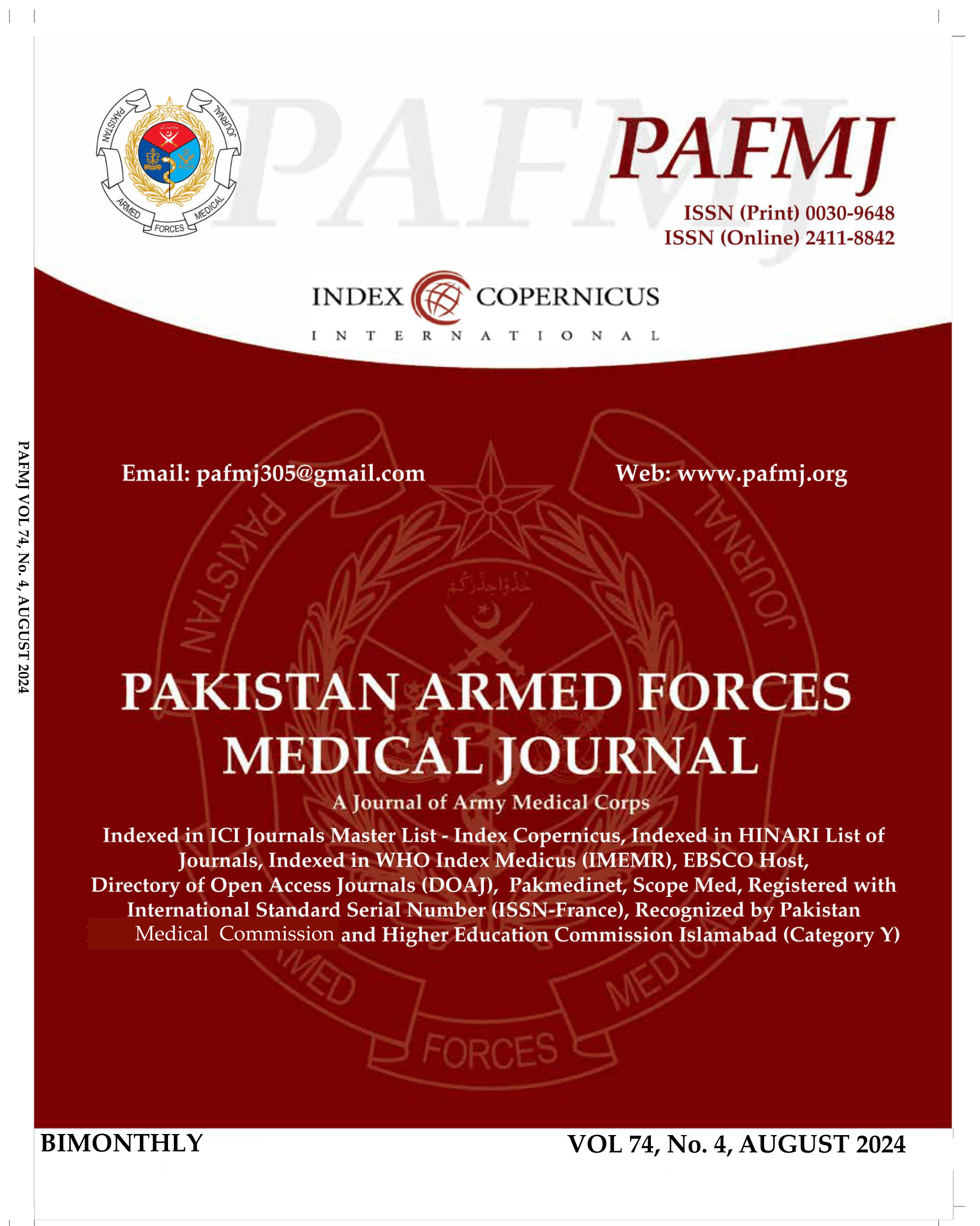Comparison of Hemodynamic Effects and Patient Satisfaction Between Lateral Versus Sitting Maternal Positions for Cesarean Deliveries in Spinal Anesthesia
DOI:
https://doi.org/10.51253/pafmj.v74i4.3160Keywords:
Anesthesia, Cesarean Section, Hemodynamics, Spinal.Abstract
Objective: To compare the hemodynamic effects of spinal anesthesia in sitting vs. lateral maternal positions in terms of patient comfort and anesthetist convenience.
Study Design: Quasi-experimental study.
Place and Duration of Study: Department of Anesthesia, Combined Military Hospital, Lahore Pakistan, from Jun 2018 to Dec 2018.
Methodology: Two hundred and sixteen patients admitted for Cesarean deliveries were randomly selected and divided into two groups of 108 each for spinal anesthesia in sitting (S-Group) or lateral (L-Group) positions. Baseline heart rate and blood pressure were recorded and readings for both were measured after every two minutes for 15 minutes. Hypotension and bradycardia were noted and treated. Patients were interviewed afterwards for comfort in sitting or lateral position and the number of spinal anesthesia attempts made were also recorded.
Results: In L-Group, 36(33%) patients had hypotension while 60(55.5%) had hypotension in S-Group. In L-Group, 4(3.7%) patients and 8(7.4%) patients in S-Group had bradycardia. Six patients (5.5%) in the Lateral-Group and 13(12%) in Sitting-Group required therapy for which the p-value came out to be significant. In Lateral-Group, 98 patients (90.7%) were comfortable and 9(8.3%) were uncomfortable, 1(0.97%) was agitated whereas in Sitting-Group 78(72%) were comfortable, 25(23%) were uncomfortable and 5(5%) were agitated. Subarachnoid puncture was 87% successful in S-Group and 74% successful in L-Group in 1st attempt.
Conclusion: Lateral spinal position was more comfortable with better hemodynamics however sub arachnoid puncture was easier in sitting position.
Downloads
References
Hofhuizen C, Lemson J, Snoeck M, Scheffer GJ. Spinal anesthesia-induced hypotension is caused by a decrease in stroke volume in elderly patients. Local Reg Anesth 2019; 12:19-26. http://doi.org/10.2147/LRA.S196313
Hasanin A, Mokhtar AM, Badawy AA, Fouad R. Post-spinal anesthesia hypotension during cesarean delivery, a review article. Egypt J Anaesth 2017; 33: 189-193
http://doi.org/10.1016/j.egja.2017.02.003
Ali M, Sharif A, Naqvi SHM. Comparison of the hemodynamic effects of lateral and sitting positions during induction of spinal anesthesia for caesarean section using hyperbaric bupivacaine. Pak Armed Forces Med J 2018; 68(1): 45-49
Pinto SL, Melo GAA, Barros LM, Neto NMG, Lisboa KWSC, Gomez EB, et al. Pregnant women positioning in spinal anesthesia for cesarean section: integrative review. Int Arch Med 2017; 10(179): 1-8.
Hajian P, Nikooseresht M, Lotfi T. Comparison of 1- and 2-minute sitting positions versus immediately lying down on hemodynamic variables after spinal anesthesia with hyperbaric bupivacaine in elective cesarean section. Anesth Pain Med 2017; 7(2): e43462.
http://doi.org/10.5812/aapm.43462
Kharge ND, Mali A, Gujjar P. Comparison of haemodynamic effects of lateral and sitting positions during induction of spinal anaesthesia for elective caesarean section. Int J Res Med Sci 2017; 5: 851-856.
http://doi.org/10.18203/2320-6012.ijrms20170619
Obasuyi BI, Fyneface-Ogan S, Mato CN. A comparison of the haemodynamic effects of lateral and sitting positions during induction of spinal anaesthesia for caesarean section. Int J Obstet Anesth 2013; 22(2): 124-128.
http://doi.org/10.1016/j.ijoa.2012.12.002
Simin A, Naghipour B, Hojjat P, Farzin H, Saeede M, Pouya HM. Effect of position during induction of spinal anaesthesia for caesarean section on maternal haemodynamic: randomised clinical trial. J Clin Diagn Res 2018; 12(2): 5-8.
http://doi.org/10.7860/JCDR/2018/31545.11163
Markley JC, Farber MK, Perlman NC, Carusi DA. Neuraxial anesthesia during cesarean delivery for placenta previa with suspected morbidly adherent placenta: a retrospective analysis. Anesth Analg 2018; 127(4): 930-938.
http://doi.org/10.1213/ANE.0000000000003674
Ni T-t, Zhou Y, Yong A-c, Wang L, Zhou Q-H. Intra-abdominal pressure, vertebral column length, and spread of spinal anesthesia in parturients undergoing cesarean section: an observational study. PLoS ONE 2018; 13(4): e0195137.
http://doi.org/10.1371/journal.pone.0195137
Kundra P, Arunsekar G, Vasudevan A, Vinayagam S, Habeebullah S, Ramesh A. Effect of postural changes on inferior vena cava dimensions and its influence on haemodynamics during caesarean section under spinal anaesthesia. J Obstet Gynaecol 2015; 35(7): 667-671.
http://doi.org/10.3109/01443615.2015.1006581
Savant P, Patwardhan K, Patil V. Study to determine overall experience of women undergoing regional anaesthesia for caesarean section. J Evol Med Dent Sci 2018; 7(41): 5203-5208.
http://doi.org/10.14260/jemds/2018/1158
Rashad Siddiqi and Syed Asadullah Jafri. Maternal Satisfaction after Spinal Anaesthesia for Caesarean Deliveries. J Coll Physicians Surg Pak 2009; 19(2): 77-80.
http://doi.org/02.2009/JCPSP.7780
Agrawal N, Rawlani S. Spinal anaesthesia in sitting position for 30 seconds vs conventional spinal anaesthesia: which is better? PJSR 2017; 10(1): 17-20
Kharge ND. Comparison of haemodynamic effects of lateral and sitting positions during induction of spinal anaesthesia for elective caesarean section. Int J Res Med Sci 2017 Mar; 5(3): 851-856. http://doi.org/10.18203/2320-6012.ijrms20170619
Sadeghi M, Bayat R, Azimaraghi O, Saliminia A. Maternal Satisfaction of Spinal Anesthesia for Elective Cesarean Section in an Academic Hospital. Ann Anesth Crit Care 2017; 2(2): e62239. http://doi.org/10.5812/aacc.62239
Ortiz-Gómez JR, Palacio-Abizanda FJ, Morillas-Ramirez F. Effect of position on maternal haemodynamics during elective caesarean delivery under spinal anaesthesia. Anaesthesiol Rescue Med 2015; 9(1): 22-29.
Soltani-Mohammadi S, Piri M, Khajehnasiri A. Comparing Three Different Modified Sitting Positions for Ease of Spinal Needle Insertion in Patients Undergoing Spinal Anesthesia. Anesth Pain Med 2017; 7(5): e55932.
Downloads
Published
Issue
Section
License
Copyright (c) 2024 Saleem Parvaiz Bajwa, Akhtar Hussain, Abdullah, Muhammad Akram; Sajid Shahzad, Umer Khan

This work is licensed under a Creative Commons Attribution-NonCommercial 4.0 International License.















